A. I. Solzhenitsyn. Inarticulate graphomaniac with a "speaking" surname
On October 8, 2016, an event took place in Moscow, which almost all mass media of "free" Russia cowardly kept silent about. At the gates of the Moscow Museum of the History of the Gulag, two young activists of the RKSM (b) hanged a scarecrow of Alexander Solzhenitsyn. Attached to the scarecrow was a plaque with an inscription in which Solzhenitsyn was called “primary enemy","who lied to us about the Gulag", And it was claimed that he"sneered at the truth". In 2015, a plaque with the words "Traitor" was hung on the monument to Solzhenitsyn in Vladivostok.
In December 2018, Putin inaugurated a monument to Solzhenitsyn in Moscow. On Solzhenitsyn Street, into which in 2008 the Bolshaya Kommunisticheskaya was renamed in violation of the law: at that time, less than 10 years had passed since the date of his death. Two days later, a plaque with the inscription "Judas" appeared on this sculpture, and a police squad was placed near the monument. In June 2019, 4 letters were rubbed to shine on the pedestal of this monument, so that the word "liar" began to stand out.

These incidents, which the Russian authorities are trying not to advertise and "not notice", are indicators that the people are tired of the incomprehensible hypocrisy of the current rulers of Russia. Who speak beautiful and correct words, but at the same time open all kinds of "Yeltsin-centers", finance the "Gaidar Forums" and include in the school curriculum the completely false works of a talentless graphomaniac declared a "great writer" and almost a "classic of Russian literature." The same one who wrote about the Great Patriotic War in his multi-page libel "The Gulag Archipelago":
Look at a photo of one of these "energetic" people:
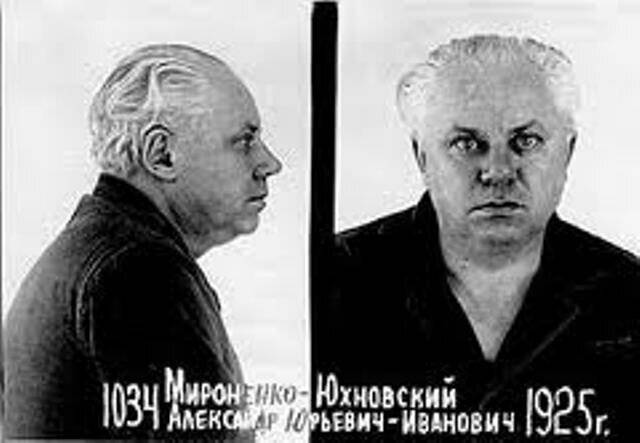
This is the former policeman Alex Lyuty (Yukhnovsky Alexander Ivanovich). In Kadievka (Stakhanov, Luhansk Oblast), he realized his “peculiar abilities” by personally dumping local residents suspected of having links with partisans into mine pits. After the war, he was hiding under the name of Mironenko. Was identified by accidentally surviving Vera Kravets, who at the time of the "execution" was 12 years old.
And how do you like this pearl of Alexander Isaich:
I forgot to add: "and would drink Bavarian beer."
Well, Stalingrad, according to Solzhenitsyn, was defended, of course, by penal battalions and companies, which this forger called “cement the foundation of the Stalingrad victory».
Marshal V.I. Chuikov, one of the main characters of Stalingrad, wrote with indignation:
Literary Vlasov
The Archipelago also contains the following lines:
Have you spattered with oil yet? Tears of affection did not flow?
By the way, the well-known traitor A. Vlasov wrote about the same in his Manifesto of April 12, 1943, addressing the Red Army men:
So it was quite rightly called in the USSR Solzhenitsyn “literary Vlasov».
Hero of the Soviet Union Vladimir Karpov wrote to Solzhenitsyn:
Solzhenitsyn's widow, N. Svetlova, even in 2010 showed adherence to principles, announcing on September 10 at the presentation of the first batch of the school edition of the Archipelago:
I really hope that we will never see such “patriots of Russia”.
A graphomaniac declared to be a great writer
At the same time, all these, if I may say so, Solzhenitsyn's opuses are written in an absolutely terrible, sloppy, incredibly heavy syllable, his language is archaic and smelled of mothballs. For me personally, reading his books literally “scratches my brain”. Therefore, now, in the process of working on this article, I simply grit my teeth, being forced to turn again to the clumsy lines of the works of this incompetent graphomaniac.
Former US Ambassador to the USSR D. Beam also wrote about Solzhenitsyn's lack of the slightest literary talent:
The Russian émigré, writer and literary critic NI Ulyanov noticed this work of American "literary blacks". He writes in the newspaper "New Russian Word" (August 1, 1971):
The same picture, by the way, is observed in the case of Viktor Rezun, who brazenly appropriated the pseudonym "Suvorov": anti-Soviet opuses published on his behalf were written by different people, it is simply striking and visible to the naked eye.
And here is how the same "Gulag Archipelago" Karel Yezdinsky, an employee of the Czechoslovak edition of the radio station "Free Europe", assessed:
As the philosopher, writer and publicist A. Zinoviev once said (deprived of Soviet citizenship in 1978 and revised his views after the collapse of the USSR):
Now tell me, do not the lines of the government telegram sent to his widow in 2008 on the occasion of Solzhenitsyn's death seem to you mocking?
"A simple Soviet prisoner, his comrade is the Bryansk gray wolf"
The circumstances of Solzhenitsyn's arrest are mysterious and incomprehensible. Out of the blue, he suddenly writes a number of letters from the front in which he openly insults the Supreme Commander-in-Chief (Stalin), informs about plans to found an underground organization "Society of True Leninists", invites his correspondents to organize themselves into conspiratorial "fives". Is he an idiot? Doesn't he know that all letters from the front (in all armies, not only in the Soviet one) are being checked out? He knows very well. And he understands that any counterintelligence, even Soviet, even Polish, even British (and so on), will come for the author of such a letter. So he wants to be arrested? And why?
The point is probably that they decided to transfer Solzhenitsyn to the front line. Yes, you heard right: the "frontline artilleryman" Solzhenitsyn actually fought in the rear - in the position of commander of a sound reconnaissance battery. That is, it was about 3-5 kilometers from the front line and tried to determine their coordinates by the sound of enemy guns. Childhood friends - K. Simonyan and L. Yezherets called Solzhenitsyn the most cowardly person of all whom they saw. And they put forward a version of "moral self-shooting."
When Solzhenitsyn found out that right now, at the very end of the war, he might have to actually shoot at the German tanks, he may have just decided to "sit out with the special officers." This, by the way, suggests that the Red Army men were not too afraid of these very special officers. Solzhenitsyn himself later admitted that the real condemnation came as an unpleasant surprise to him: he believed that he would not be jailed for such "nonsense" - after all, there was no information constituting a state secret in his letters. But, thanks to "cooperation with the investigation," he received a relatively mild sentence: 8 years in camps without confiscation of property. At the same time, he was released already in 1952.
The investigation into the Solzhenitsyn case lasted only 9 days. During this time, he wrote denunciations of his friends, acquaintances, and even his wife, who, not knowing about it, carried him parcels to the Lubyanka and Butyrka prison.
The Czechoslovak journalist Rzezac Tomas in his book "The Spiral of Treason of Solzhenitsyn" tells about a conversation that he had with an investigator who was in charge of the case of the future Nobel laureate. He said that Solzhenitsyn belonged to the type of "soft-bodied" persons under investigation,
Nikolai Vitkevich, a childhood friend of Solzhenitsyn (he cut his fingers with a knife and swore in friendship on blood), was sentenced to 10 years on his denunciation. He was amazed when the investigator gave him the testimony of a former "friend" to read:
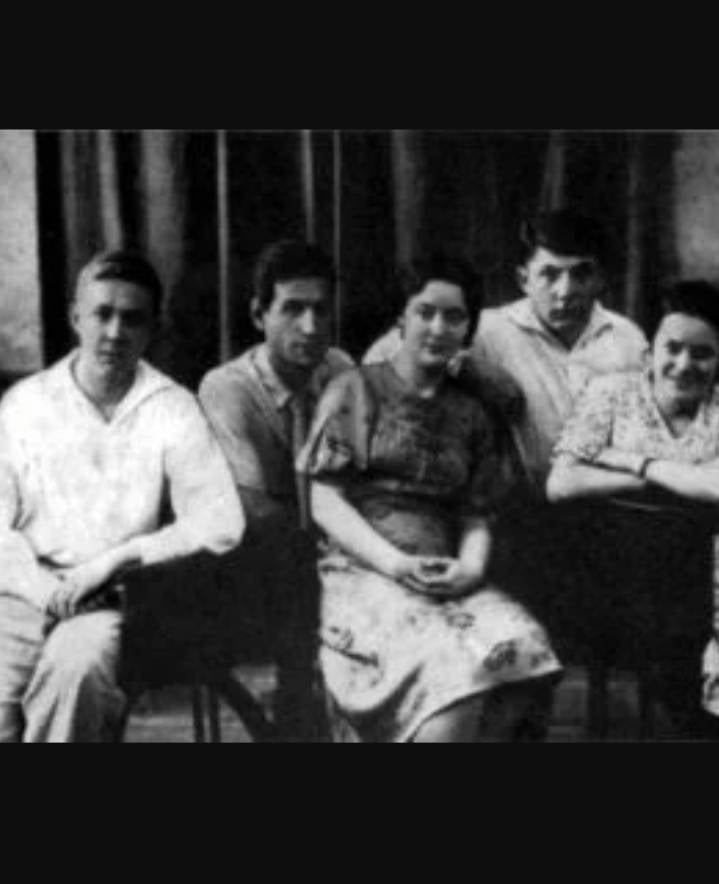
Childhood friends: Alexander Solzhenitsyn, Kirill Simonyan, Natalya Reshetovskaya (Solzhenitsyn's first wife), Nikolai Vitkevich, Lydia Ezherets
KS Simonyan, a famous surgeon, professor, doctor in charge of Academician Landau, recalled the summons to the state security investigator in 1952. He asked him to give explanations on Solzhenitsyn's denunciation:
At the end of the conversation, Simonyan asked the investigator:
The answer was as follows:
And who inspires sympathy here? The cowardly "fighter against the regime" AI Solzhenitsyn, who slandered his wife and friends? Or a "bloody Chekist" who quickly figured out this matter and released the unjustly slandered surgeon?
It is not surprising that Simonyan later spoke very impartially about this dissident. And Solzhenitsyn answered him with hypocritical regret in the Gulag Archipelago:
No comments. There are no words.
In the future, Solzhenitsyn will demonstrate his cowardice more than once. By his own admission, he was recruited into "snitches" and received the pseudonym "Vetrov". Innocently explains to readers:
In one of his letters, Solzhenitsyn reports on the conditions of detention in the central political prison:
The version of Solzhenitsyn's "moral self-shooting" put forward by K. Simonyan and L. Yezherets is confirmed.
But how well Aleksandr Isaevich settled down in the “terrible gulag” then: he sleeps warmly and dryly, he is provided with linen, plays chess, reads books. And the wife slandered by him regularly carries parcels. And in "Sharashka Marfino" - in addition to rations, a pound of white bread every day and butter in addition, any books from the Lenin library, playing volleyball, free use of the radio, work in the specialty in an acoustic laboratory. The prisoner Solzhenitsyn relaxed and became so impudent that he began to be rude to his superiors. Therefore, they sent him to the Ekibastuz camp, where he did not live in poverty either: having offered the services of an informer to the administration, he first received the position of a foreman, and then became a librarian.
Lev Nikolayevich Gumilev wrote the book "Hunnu" in the library of the Karaganda camp, and while in the hospital of the Omsk camp - the work "Ancient Turks", on the basis of which he later defended his doctoral dissertation. Librarian Solzhenitsyn collected rumors and gossip. For example, such:
Do you need to comment on this bike? Or is everything clear? If the guards had missed at least one person in the morning, everyone would have gone to court. This is what, really, you will not doubt.
But our pseudo-classic continues to rave:
Fear of open fire is an unconditional instinct, and it is impossible to get around it. Once in front of a wall of flame, people forget even about the fear of heights and jump from balconies or roofs of multi-storey buildings.
Do you feel the difference between the two camp librarians: Gumilev and Solzhenitsyn?
I must say that among real prisoners Solzhenitsyn's tales caused two reactions: one half - laughter, the other - anger with obscenities. Varlam Shalamov, for example, belonged to the second category. And he wrote:
Only Russian liberal intellectuals (sincerely, out of stupidity) and foreign curators (on duty) trusted Solzhenitsyn.
But the informer Solzhenitsyn-Vetrov did one good deed in the Ekibastuz camp: he informed the leadership about the preparation of the uprising of Western Ukrainian nationalists. True, for selfish reasons: I learned that the first thing the Bandera men would do with the informers identified. So he wrote at the end of his denunciation:
Winds
20.1.52. "
Pay attention to the date? 1952, in which Solzhenitsyn was released early from prison. The Gulag appreciated his efforts. At first, they were carefully placed in the infirmary so that other prisoners would not strangle or stab at night, then they were transferred to another camp, and from there almost immediately - "to freedom with a clear conscience."
After "many years of continuous suffering" in the camps, Solzhenitsyn lived for 89 years. And most of the real front-line soldiers did not live to see 70.
During my school years, I still managed to listen to the stories of real front-line soldiers who survived all these terrible years. These were my relatives, their friends and acquaintances, neighbors. And do you know what caught my eye? They knew nothing about the "Stalinist repressions"! Can you imagine that? At night, it means that "funnels" drive around, "Stalin's satraps" grab people indiscriminately, and colleagues, relatives, neighbors of these "innocent victims" do not notice anything?
During family holidays, after drinking, the front-line soldiers sometimes recalled Khrushchev's notorious report. From these stories it followed that the reaction of society to Khrushchev's fabrications was shock. People did not know that, it turns out, all these years they lived in a "police state" in which "half of the population sat, half - guarded." One of these old men, in a fit of frankness, said that he then went to the district committee and threw his party card in the face of the first secretary. Explaining that he was doing this because Khrushchev, as it were, to put it mildly, "slandered the Party." The secretary remained silent (apparently, he completely agreed with him) and no organizational conclusions, and even more so no repressions followed: they were not fired from work, they were not removed from the queue for an apartment, vouchers to the sanatorium were given every year, and so on.
By the way, during my entire life I saw only one person, whose parents were exiled under Stalin - in the 90s he was given benefits, and he "went king." At the same time, the people who knew him whispered that his grandfather was a real fist and a world eater.
"The book that deceived the whole world"
Many dissidents (both in Russia and abroad) at first did not accept the Gulag Archipelago and considered this book harmful to their movement. The reason was the monstrous falsifications and fabrications, which, it seemed, could not be believed by any person. Alas, they believed it, albeit for a while. But now the second and almost official name of this dirty libel on the USSR is "The Book That Deceived the Whole World."
Solzhenitsyn did not have access to archives and documents. He collected gossip, rumors, camp folklore. Information about "Pecherlag", for example, he received "accidentally from a prisoner who had access to them at that time". "Super reliable" source, isn't it?
But I also added a lot on my own. As a result, Varlam Shalamov, who at first told Solzhenitsyn a lot about his life in the camps, sharply changed his attitude towards him and gave the following order:
Solzhenitsyn publicly called on US presidents to put pressure on the USSR and the socialist countries. And Varlam Shalamov wrote:
Do you feel the difference between a decent person and a traitor?
But what about Solzhenitsyn's facts and figures?
After the release of Archipelago, the leaders of the Central Archive, through the magazine Knowledge to the People, mockingly turned to Solzhenitsyn:
Naturally, there was no answer.
In 1941, according to Solzhenitsyn, “we had 15 millionth camps».
In the same second volume of The Archipelago, he writes:
And in an interview that Solzhenitsyn gave in 1976 on Spanish television, he, apparently forgetting about this figure, already speaks of 110 million "victims of socialism." In the same interview, he praised the recently deceased dictator Franco and warned the Spaniards against democratic change.
By the way, Joseph Goebbels, for all his shameless impudence, spoke of only 14 million repressed in the USSR. Poor dilettante! How far is he from our "Judas" Alexander Isaevich!
Meanwhile, the commission for the rehabilitation of victims of political repression, created during the years of Perestroika by a member of the Gorbachev Politburo Yakovlev, has determined the exact numbers. It turned out that during the entire existence of Soviet power, from 1919 to 1990, 3 786 094 people were convicted under political articles, of which 642 980 people were shot. Moreover, 90% of these arrests and executions fell on two years - 1937 and 1938. At the time, the NKVD was headed by the pederast Nikolai Yezhov, suffering from an inferiority complex. The dwarf's head was spinning from the power that fell on him. To get rid of him, he had to call in Moscow a man who least of all wanted to work in the NKVD system and dreamed of a career as an engineer and builder. And his name was Lavrenty Beria.
By the way, the famous 58th article had 14 points. Only three of them were "political" (like "counter-revolutionary agitation"). The rest are espionage, terrorism, banditry, and so on. So not all those convicted under this article "suffered for jokes."
Despite all efforts, only about 800 thousand people managed to rehabilitate Yakovlev's commission: the rest (almost three million) were justly convicted and no grounds for rehabilitation were found.
At the time of Stalin's death, in March 1953, there were 2 people in prisons and camps. Political - 526 402 (221%). Many of them at that time were SS men from the Baltic states and Western Ukraine, Vlasovites and policemen. In addition, their ranks were constantly replenished with animal-like "green brothers" from the Baltic states (the plot lines of the famous film "Nobody Wanted to Die", even in Lithuania, no one disputed) and natural-born sadistic Bandera from Western Ukraine. There were 435 8,76 people convicted of espionage among the "political" people, 9 617 for terror, 8 893 for sabotage. There were 3 780 convicted nationalists.
Bandera, "green brothers", former policemen, as a rule, received six years of exile (just!). And only if there was one hundred percent evidence of their participation in war crimes and massacres of civilians, they were sentenced to 10 years in camps. Here they were waited for by a fully paid nine-hour working day, a work book, a full social package and, it is not clear from what fright, the Khrushchev amnesty for the tenth anniversary of Victory in 1955. More than 20 OUN members then returned to Western Ukraine alone.
Yu Nersesov wrote:
Another monstrous lie of Solzhenitsyn is the statement about mass repressions in Leningrad:
That is, 650 thousand people were allegedly arrested in two years. The city should have simply become depopulated. According to official figures, 93% of those arrested in the USSR were men. Thus, if we accept Solzhenitsyn's data, only 250 thousand able-bodied men should have remained in Leningrad. Who then worked at the numerous factories and factories of Leningrad, on the railways and at municipal enterprises? And who joined the people's militia en masse after the start of the Great Patriotic War?
Let's now see what proportion were prisoners in the USSR, calculated per 100 thousand of the population. In the 1930s. (in the midst of the terror) in Soviet prisons and camps there were on average 583 convicts per 100 population. In "democratic" Russia in 000-1992. - 2002 prisoners per 647 population. In the "superdemocratic" USA in the same period - on average 100 people per 000 thousand of the population. Either there were no massive repressions in the USSR in the 626s, or even more large-scale repressions were carried out in the 100s of the XX century in Yeltsin's Russia and in the United States.
For what terms were political prisoners in the USSR sentenced? Apparently for at least 10 years? It turns out that in 1936 42,2% of them were sentenced to a term of up to 5 years, 50,7% received a term of 5-10 years. Until 1937, the 10-year term was the maximum.
And what about the death rate in the "Stalinist camps"? Solzhenitsyn, without batting an eye, claimed: 1% of all prisoners per day died (!).
Indeed, why not believe the liar Solzhenitsyn - on condition that reading his libel will be imbecile.
In fact, the death rate in the camps in peacetime did not exceed the national average. The usual ration of prisoners corresponded to that of civilian workers, and the ration of the penalty box was five times higher than the Leningrad blockade norm of ordinary male workers.
Now appreciate the following passage from Solzhenitsyn:
In this place, one recalls the lines about Moscow from Brodsky's disgusting (in every sense) poem "Performance":
And the epigram of Valeria Vyushkina:
After all, Hitler for him is a hero of the bourgeois will!
His anti-Soviet nonsense is held at school!
Solzhenitsyn the liar is full of sins!
Vermont scumbag, impudent all more,
He appealed to Reagan: “Socialism until
Will you tolerate ?! Moscow is time for a long time
Bomb like Hiroshima! Sorry for the bomb, or what?! .. "
This refers to the speech of Solzhenitsyn, shown in the film "The Price of Peace and Freedom", which was created by order of the American "Committee on the Existing Danger" (1978). Solzhenitsyn says there about our country:
That is, there was still a veiled call to strike at the USSR.
In general, all this, of course, is ridiculous: the coward and informer Solzhenitsyn threatens the guards. He is not afraid to receive cuffs from them, or an increase in the term for a political statement. And in addition, he is well aware of the secret "Atomic Project", as well as the plans of US President Truman.
Solzhenitsyn's exaggerated figures on the number of prisoners in Kolyma, where “9 months winter - rest summer”, And not only prisoners, but all goods and supplies are brought once a year - to navigation. And until now, the population is regulated by the ability to really feed it.
In conclusion of this short story, let me remind you: on September 9, 2009, by order of the Minister of Education and Science of the Russian Federation A. Fursenko, the thoroughly deceitful anti-Soviet and anti-Russian libel of Solzhenitsyn "The Gulag Archipelago" was included in the school curriculum.
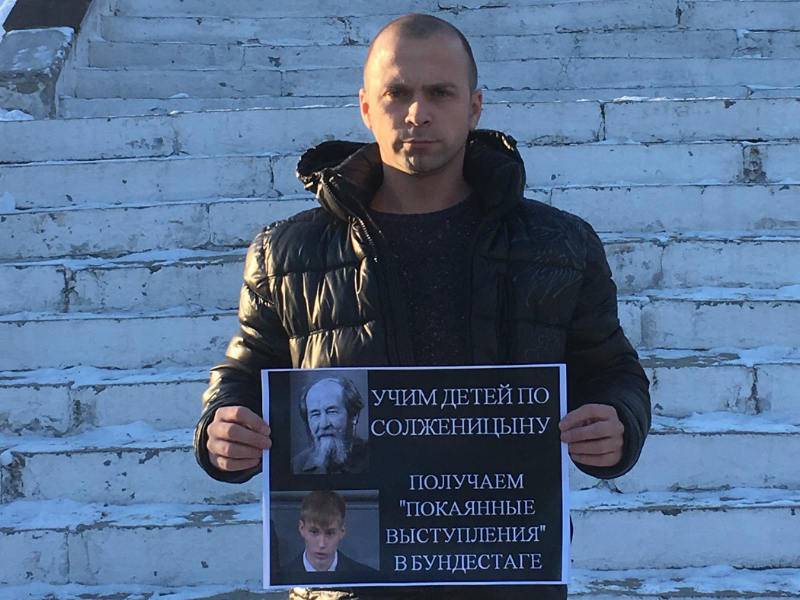
At an age when children really want to love their homeland, teachers of modern Russia are forced to make them read stupid and terrible tales about the "evil empire."
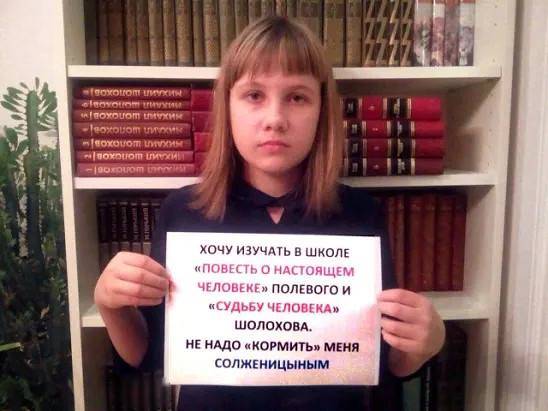
A symbol of this ideological sabotage against future generations, and the attitude of the Russian authorities to the opinion of the overwhelming majority of the country's citizens, can probably be called this recent "gift" to Muscovites, which can be seen on Bolotnaya Square:

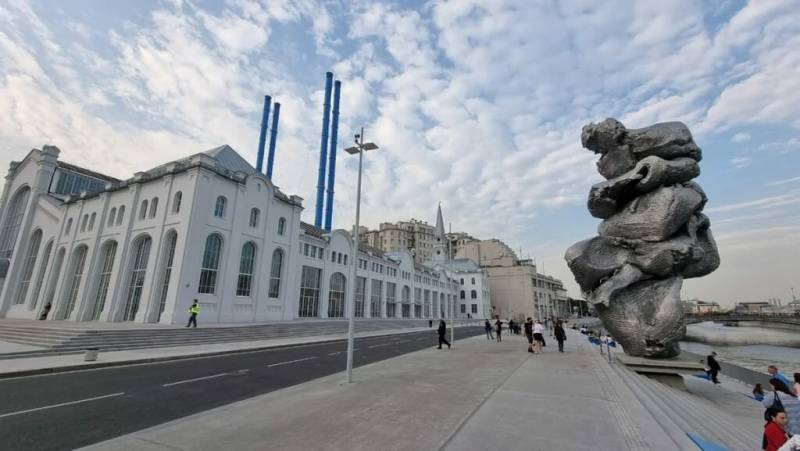
Information